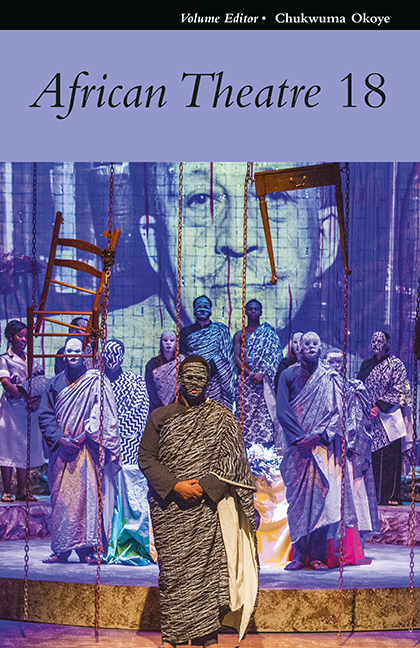NAFEST Danceturgy in Search of Integration & Identity A Study of Selected Nasarawa State Dance Entries
Published online by Cambridge University Press: 02 April 2020
Summary
The National Festival of Arts and Culture (NAFEST) is an annual festival in Nigeria, designed to serve as a veritable index for the promotion of national peace and unity and cultural exchange, as well as a platform for engineering creativity. The festival came into being in 1970 following the protracted Nigerian civil war which lasted from 1967 to 1970. The idea of the festival was conceived to facilitate the reintegration of the war-torn zones into the nation. Since then, the festival, which draws its participants from all the thirty-six states of Nigeria, has solidified, and come to be known as the ‘Festival which unites the nation’ (Ben- Iheanacho 2017).
NAFEST features and promotes the diverse tangible and intangible artistic expressions of the many cultures of the Nigerian nation. These cultural arts are showcased in various competitive and non-competitive events of NAFEST such as Indigenous Dance and Music, Traditional Wrestling, Drama, Choral Music, Traditional Cuisine/Food Fair, Traditional Furnished Apartment, Children's Moonlight Games, Crafts Expo/Fair or Cultural Market, Poetry, Live Presentations of Nigerian Dress Culture, Specialized Exhibitions, Children’s Essay Writing, Children's Drawing/Painting Exhibition, NAFEST Colloquium/Book Fair, Opening and Closing Ceremonies.
Dance, which is an integral aspect of the diverse Nigerian cultures, has been identified as one of the vital features of NAFEST (ncac.gov.ng). However, beyond the pomp and pageantry which typifies NAFEST, its ideological basis as a unity festival has not been adequately reflected in the choreography of the dances performed on the forum. In spite of their multi-ethnic nature, most participating states at NAFEST are observed to feature mono-cultural dance entries, thereby promoting specific cultures to the detriment of others. More importantly, the unique attributes of the dance art as a device for cultural integration and identity formation have not been properly situated within the context of NAFEST. Consequently, several states that participate at NAFEST have been observed to grapple unsuccessfully with actuating the stipulated themes of its danceturgy, a transposition of the idea of dramaturgy on dance art and practice, to mean the study of the craft and techniques of dance composition and the representation of the main elements of choreography in performance.
- Type
- Chapter
- Information
- African Theatre 18 , pp. 22 - 41Publisher: Boydell & BrewerPrint publication year: 2019



